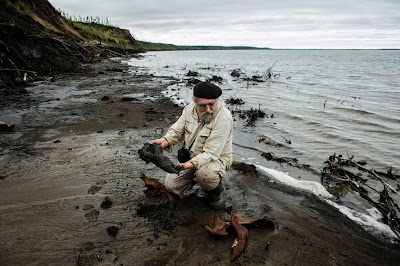Like ex-president Trump, some 60% of Russians believe that climate change is fake, but, there are also Russians like Sergey Zimov.
Sergey Aphanasievich Zimov (1955) is a Russian geophysicist who specialises in arctic and subarctic ecology. He is the Director of Northeast Scientific Station (a research institute of the Russian Academy of Sciences), a senior research fellow of the Pacific Institute for Geography (an institute within the Far East Division of the Russian Academy of Sciences (FED RAS)), and one of the founders of Pleistocene Park (a 160 km2 wildlife preserve and a research substation of the Northeast Scientific Station).
Zimov began the Pleistocene Park project in 1988 in northeastern Siberia near the Northeast Science Station in Cherskii, in the Sakha Autonomous Republic. Pleistocene Park seeks to test the hypotheses that large herbivores maintained the Pleistocene tundra steppe and that overhunting by humans caused both the animals and Pleistocene ecosystem to vanish.
He is best known for his work in advocating the theory that human overhunting of large herbivores during the Pleistocene caused Siberia's grassland-steppe ecosystem to disappear and for raising awareness as to the important roles permafrost and thermokarst lakes play in the global carbon cycle.
In collaboration with Dr. Terry Chapin and Dr. Katey
Walter-Anthony, Zimov has published a collection of scientific papers exposing
the importance of permafrost and high-latitude carbon dioxide and methane
emissions in the global carbon cycle. These papers identified methane
ebullition from thermokarst lakes to be a significant source of atmospheric
methane, a potent greenhouse gas.
Permafrost is a large global carbon reservoir which has remained frozen throughout much of the Holocene. Due to recent climate change, the permafrost is beginning to thaw, releasing stored carbon and forming thermokarst lakes. When the thawed permafrost enters the thermokarst lakes, its carbon is converted into carbon dioxide and methane and released into the atmosphere. Methane is a potent greenhouse gas and the methane emissions from thermokarst lakes have the potential to initiate a positive feedback cycle in which increased atmospheric methane concentrations lead to amplified global climate change, which in turn leads to more permafrost thaw and more methane and carbon dioxide emissions.
And yes, Sergei Zimov is a dedicated beret-wearer.









No comments:
Post a Comment